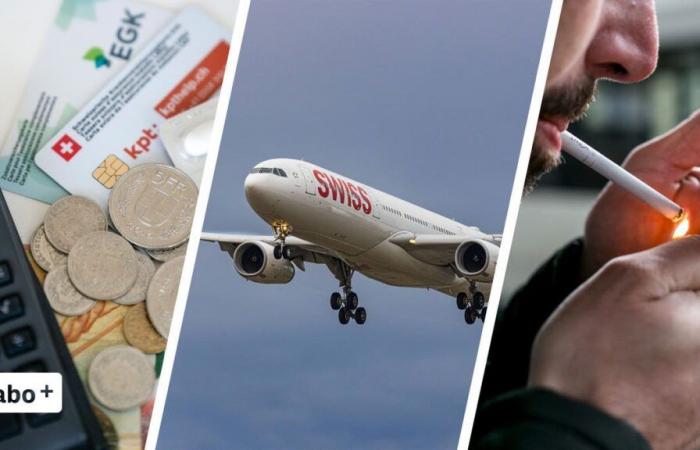This will be cheaper in 2025 – and it will cost us more
A lot of things will be more expensive in the new year. But some prices will also fall. You can find the most important innovations for 2025 in this overview.
A lot of things will be new in 2025. It’s only logical that this will also have an impact on your wallet.
At the turn of the year, we have put together in this article what will be cheaper or more expensive from January. And what you might get more money for in the new year:
Inflation is disappearing as quickly and violently as it came. For many people, the decline in inflation has a positive impact on rents, wages and interest rates. The fact that fees for borrowed capital are currently falling takes pressure off rents in particular.
Meanwhile, the opposite can be observed when it comes to wages: Because inflation is currently falling faster than the social partners expected, employees are likely to have higher purchasing power again in 2025, after two years of decline.
More money: AHV and IV pensions are increasing
In the new year, first pillar pensions will also rise by 2.9 percent. Specifically, the minimum pension from old-age and survivors’ insurance (AHV) and disability insurance (IV) will increase from 1,225 to 1,260 francs per month. The maximum pension will now rise from 2,450 to 2,520 francs. The AHV pension for married couples will now be 3,780 francs. The last increase in the AHV pension was two years ago. This was adjusted to price and wage developments for the last time in 2023.
The increase in the AHV pension also affects the mandatory occupational pension scheme (BVG): in 2025, the coordination deduction in the BVG obligation will be increased to 26,460 francs, and the entry threshold will rise to 22,680 francs.
Higher family allowances
The minimum amounts for family allowances set by the federal government will be increased at the beginning of 2025: the child allowance will now be at least 215 francs per month instead of 200 francs; the training allowance is 268 instead of 250 francs per month. This is the first increase since 2009.
Parents who work in the cantons of Aargau, Basel-Landschaft, Glarus, Solothurn, Ticino, Thurgau and Zurich benefit from this. In the other cantons, family allowances are already higher than the new minimum amount.
AHV age for women is rising
The second stage of the reform to stabilize the AHV will come into force at the beginning of 2025. This only affects women born after 1960. Your reference age (previously “retirement age”) will be gradually increased by 2028; After that, the uniform reference age of 65 years applies to women and men (see Table 1).
Health insurance premiums are becoming even more expensive
The premiums for compulsory health insurance (KVG) will also rise in 2025 for all age groups. Sometimes even very strong once again. Specifically, the average monthly premium in Switzerland next year will be 378.70 francs, which corresponds to an increase of 6 percent compared to the previous year.
However, the differences are sometimes enormous from canton to canton. In rural Appenzell Innerrhoden, insured people pay an average monthly premium of 257.80 francs (+13.40 francs). In urban areas, however, the average monthly premium is sometimes well over 400 francs. The overview by canton can be found in the table below:
There are also a few other innovations in the healthcare system in the new year. For example, from 2025, health insurers will only be able to operate their insureds twice a year. From July 2025, cantons will also be able to assign loss certificates for unpaid premiums.
Insured persons with a free choice of doctor can now also switch to an alternative insurance model during the year. However, switching to another health insurance company during the year is not possible.
Europe-wide environmental fees also make Swiss flights more expensive
Flying will also become more expensive in the new year: Lufthansa will be charging a new environmental fee from 2025. This is intended to pass on some of the costs that arise, for example, from EU environmental regulations. The Swiss airlines Swiss and Edelweiss, which also belong to the German airline, are also affected by the price increase.
The new environmental fee depends on the length of the flight and should be between 1 and 72 euros, it was said last summer. Lufthansa reports the fee for take-offs for all of its group airlines in all 27 EU countries as well as in Great Britain, Norway and Switzerland. The only exception are tickets on the eurowings.com platform, where customers are only shown gross prices.
-Electricity prices are falling significantly
After massive increases in some cases, not least as a result of the war in Ukraine, electricity will be significantly cheaper in many places in the new year. Specifically, electricity prices will fall by an average of 10 percent in 2025. However, they remain higher than three years ago. And there will continue to be massive local differences.
In the map below you can see how the electricity price in your community will change in the new year:
Shopping abroad is becoming more expensive: the Federal Council is halving the duty-free limit
From 2025, anyone shopping abroad will have to declare goods worth more than 150 francs.
Bild: Keystone
The federal parliament and the cantons of St. Gallen and Thurgau had called for the reduction. The Federal Council finally halved the duty-free limit for private purchases from 300 to 150 francs on January 1, 2025. In other words: In the new year, goods with a value of 150 francs or more will have to be taxed at customs. If the total value is higher, Swiss VAT will be due on the imported goods. Shopping tourism across the border should be restricted.
It’s only logical that the decision across the border isn’t well received. Because Germany fears a loss of sales. And so the neighboring country to the north is already planning measures to keep shopping attractive for Swiss people. The paperwork for the refund of German VAT is to be digitized. On the other hand, the de minimis limit of 50 euros per purchase introduced in 2019 is to be lifted.
An even lower value-free limit, as demanded by economic politicians in the Swiss Council of States, would “disproportionately increase” the customs clearance and control costs for both the Federal Office of Customs and Border Security and for travelers, the federal government explained its decision in October. Because: The lower the value-free limit is set, the greater the number of customs clearances.
Foreign online shops also have to pay VAT
From New Year’s Day, foreign online providers with a turnover of more than 100,000 francs per year will be treated the same as companies based in Switzerland when it comes to VAT. However, up to a goods value of 62 francs (at the VAT rate of 8.1 percent, or up to 193 francs at the lower rate of 2.1 percent), no import tax will be charged in the future, as the lower VAT limit of 5 francs remains.
Customs refrains from collecting such small amounts due to disproportionately high administrative costs. This rule also applies if a more expensive order is split into several packages. Individual packages are assessed, not individual orders in the online shop.
Employees can deduct professional expenses at a flat rate from their taxes
Employed people should now deduct professional costs from their taxes in the form of a uniform flat rate. The flat rate includes meals and other professional costs. Proof of the actual costs is excluded for the costs covered by the flat rate. The new regulation should also apply to cantonal taxes, with the determination of the flat rate being left to the cantons.
The new flat rate does not cover travel costs or accommodation costs for a weekly stay abroad. The previously applicable regulations for these deductions remain in effect.
To plug the federal government’s budget hole: tobacco is becoming more expensive
In order to achieve a budget that is as balanced as possible in 2025, the federal government has not only cut its spending. The Federal Council has also decided that, for example, revenue from the tobacco tax should be increased “moderately”.
Specifically, the tax rates on cigarettes, cigars, cigarillos, fine-cut tobacco and other tobacco products are expected to increase by a total of 45 million francs in 2025. According to the administration, this sum corresponds to a surcharge of around 40 centimes per pack.
Pillar 3a: Gaps can now be filled retroactively
It took a long time for missed contributions to Pillar 3a to be paid. Starting next year, it will be possible to make additional payments for amounts not paid in over the last ten years. However, the first opportunity for a subsequent purchase will not be available until 2026 for the coming year. No retroactive purchasing is planned for the current and previous years.
The gap is the difference between the maximum amount applicable in the year in question and the amount actually paid in. The values are correspondingly higher for people who are not affiliated with a pension fund. Another condition is that you then, as now, have earned income that is subject to AHV and pay the full 3a amount in the current year.
The amount that can be paid into Pillar 3a in 2025 is now a maximum of 7,258 francs (or a maximum of 36,288 francs for self-employed people without a pension fund).





